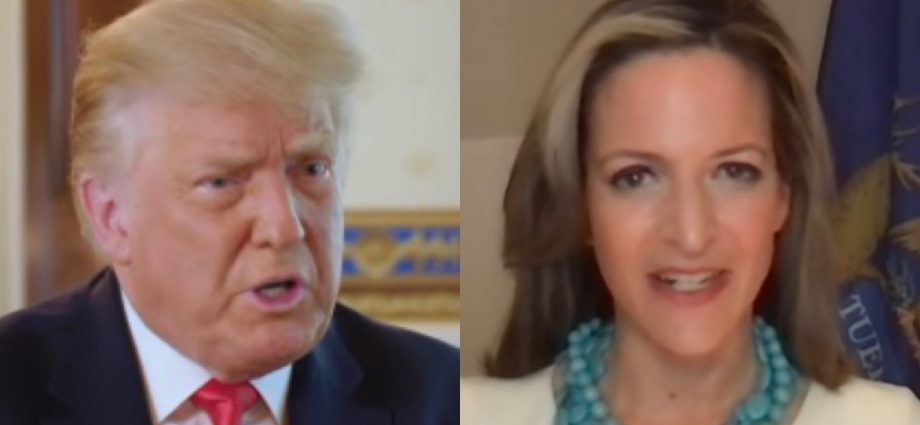Democrat Jocelyn Benson was elected in 2018 as the Secretary of State in Michigan, a role that carried an extra importance ahead of the November election last year due to the Coronavirus.
Ahead of the election, Benson, who appeared on MSNBC both before and after the election, issued guidance that said local clerks should start with a presumption of validity when verifying signatures on absentee ballot applications, but a recent court ruling said that rule wasn’t properly established.
Last week, A Michigan Court of Claims judge ruled that clerks no longer need to follow those instructions for determining whether to send an absentee ballot to applicants.
A March 9 opinion and order issued by Judge Christopher M. Murray rebuked Benson for issuing instructions that constituted “rules” without following the process for creating a formal rule under state and federal law.
“The guidance issued by the Secretary of State on October 6, 2020, with respect to signature-matching standards was issued in violation of the Administrative Procedures Act,” Murray wrote.
Former President Trump had previously directed his ire at Benson in May of last year, which ended up getting “fact checked,” as Factcheck.org said that he “erroneously tweeted that Michigan’s Democratic secretary of state was ‘illegally’ sending “absentee ballots to 7.7 million people” for this year’s primary and general elections.”
From MLive.com:
The Michigan Republican Party and Allegan County Clerk Robert Genetski, who jointly filed their complaint prior to the Nov. 3 election, claimed the signature standards allowed for “invalid” ballots to be counted.
Murray noted in his opinion that Genetski, however, never claimed the “guidance caused him to accept a signature that he believed was invalid.”
Benson’s guidelines focused on signature verification of absentee ballot applications and their return envelopes, which were to be compared against each other as well as against signatures in qualified voter files.
Benson’s office said “that signature review ‘begins with the presumption that’ the signature on an absent voter ballot application or envelope is valid,” Murray wrote. The Secretary of State’s instructions to clerks further said signatures with any “redeeming qualities” — described as those having “similar distinctive flourishes” or those with “more matching features than nonmatching features” — should be validated.
Only signatures with “multiple significant and obvious” inconsistencies should be questioned, Benson advised, according to the judge’s analysis of the rule.
Murray determined the guidelines fell within the definition of an administrative rule and therefore should have been approved through the formal rule-making process, which requires multiple steps.
“An agency must utilize formal rulemaking procedures when establishing policies that ‘do not merely interpret or explain the statute or rules from which the agency derives its authority,’ but rather ‘establish the substantive standards implementing the program,’” Murray said, citing a 1998 precedent.
The ruling leaves certain standards for accepting absentee ballot application signatures at the discretion of the local clerk, unless the Legislature created legal guidelines or the Secretary of State’s Office creates administrative rules for that determination.
The current law states any signatures on applications or return envelopes that don’t “agree sufficiently” with the voter signature on file should be rejected.
The Court of Claims judge noted Michigan law doesn’t clearly define what it means for a signature to “agree” or “agree sufficiently.”
Representatives from Attorney General Dana Nessel’s office didn’t respond to a request for comment on the ruling and it’s unclear if the Court of Claims decision will be appealed.
“We have no comment at this time,” Tracy Wimmer, an SOS spokeswoman said.
Clerks additionally compare signatures on absentee ballots with signatures on file before votes are counted during any election.
Fewer than 1 percent of Michigan’s 3.3 million absentee ballots cast in the Nov. 3 general election were rejected by local election clerks, according to data released by the Secretary of State’s office.
In total, 15,300 ballots were rejected by election officials for a variety of reasons, such as arriving after Election Day or not having a signature. In the August primary election, more than the 10,600 ballots were rejected.
- Tim Kaine Provides Cover For Joe Biden on the Border Crisis, Blames Lack of a ‘Robust Work Visa Program’ for ‘Some of the Chaos at the Border’ - March 27, 2024
- Elon Musk Rips NBC For Hiring and ‘Immediately’ Firing Ronna McDaniel ‘That’s How Biased They Are!’ - March 27, 2024
- Marjorie Taylor Greene Makes Move, Files Motion to Vacate Against Speaker Mike Johnson After House Passage of $1.2T Spending Bill - March 22, 2024

